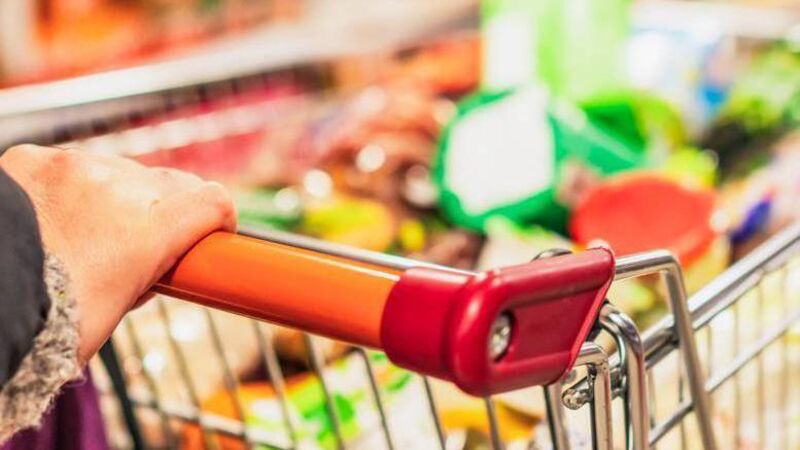Cork Views: Use the self-service check-out? No thanks, I’d prefer to avoid it

People who meticulously sprayed trolleys and basket handles with sanitiser during the covid pandemic, are now often using these self-checkout screens without sanitising, says Áilín Quinlan.
At that point, I noticed the traditional cash register lanes seemed to be empty and closed. There didn’t seem to be any cashiers around either.
There was a queue of people putting items through the self-service check-outs under the eye of a uniformed employee who politely gestured to me to join them all.
I demurred; he approached and politely offered to help me through the self-service check-out process. It wouldn’t take us all that long to process the mountain of groceries in my basket, he said, adding reassuringly that it was quite a straightforward process.
Equally politely, I explained that I preferred to avoid self-service checkout areas.
The thing that worried me, I explained, was the possibility that sickness-causing bacteria could potentially be on the screens I’d have to touch. I was emerging from long covid, I added, and my immune system was still dodgy.
Think for a moment about the many hands using these screens. All day long. All kinds of hands. Belonging to people who may, for example, have a bug or virus, and who may cough into the screens or who may not always make a habit of washing their hands after using the toilet.
A couple of years ago, scientists found that supermarket self-checkout screens carry one of the highest bacterial loads of a whole range of devices and public facilities.
Scientists from the Infection Innovation Consortium at the Liverpool School of Tropical Medicine tested check-out self-service areas, handrails, door handles in public toilets and office computer keyboards and so on, looking for signs of unpleasant bacteria.
They found several different types of potentially disease-causing bacteria on screens at retail self-service checkout areas. There was e-coli, which can cause severe vomiting, particles of human faeces, and a bacteria called Enterococcus (an organism found in human faeces which can lead to disease, particularly in people with weak immune systems.)
The tests also showed the presence of microbes that lead to urinary tract infections.
So, not to put too fine a point on it, there is the possibility that these screens may be quite unsanitary.
People who meticulously sprayed trolleys and basket handles with sanitiser and cleaned their hands before and after every shopping trip and at every petrol station during the covid pandemic, are now often using these self-checkout screens without sanitising. How quickly we have forgotten how easily an illness-causing bacteria or a really nasty virus can transfer from the environment directly into our bodies?
I didn’t see any bottles of the anti-bacterial hand sanitising gels the retailers were so good at providing during the pandemic.
Will traditional cashier lanes eventually be eliminated altogether by the big supermarkets? The thought makes me nervous.
Passing through an airport last week, I stopped at a shop to get a bottle of water. There was no cash desk in the shop. The shop assistant said there was no option but to use the self-checkout facility. I said I just couldn’t as I had only recently emerged from long covid and was wary of catching something. She kindly did it for me.
Another thought: what may these self-checkout areas mean in terms of employment?
I also suggested that he regularly sanitise his hands after helping customers at those self-service checkout screens.
Interesting that in the United States, they already seem to be growing less happy about self-checkout areas.
A number of major US stores have decided to limit or even ban self-checkout areas.
Theft, it seems, has become an issue. It seems some shoppers take advantage of the lack of staff around self-checkout areas to bag items they never scanned.
Sometimes, customers also enter the wrong code. Or scan the wrong code.
Research shows retailers are discovering a loss rate of 4% at self-service checkout areas, which is twice the industrial average.
Then there are the inevitable glitches. Machines can get a bit finicky and break down which causes frustration on all sides. (Last Christmas, I saw a massive queue in the self-checkout area of one busy Cork city supermarket. Several of the self-checkout machines were out of order and the self-checkout queue moved at a glacial pace.)
There’s also an interesting psychological and emotional element which is coming to the fore. This is the issue of disappearing customer loyalty.
You see, human cashiers can often be quite friendly.
They will engage in small talk, which can foster a sense of community with customers and loyalty to the shop.
It now seems that the fast, anonymous automated systems lack that personal touch which engages customer loyalty. So, there are some disadvantages to self-checkout that have already been pinpointed by big retail chains in the USA.
Doesn’t every silver lining have its clouds…







 App?
App?




